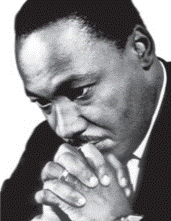C. Read the message again and answer the questions.
Страны и люди
Active vocabulary: tolerance, ignorance, jealousy, selfishness, suspicion, offence, distrust, prejudice, fear, destiny, vulnerability, tension, diversity, inequality, exclusion, bond.
1a. Read the famous quotation of Martin Luther King Jr. What does it mean?
“We may have all come on different ships, but we’re in the same boat now.”
1b. In our diverse world, intolerance towards other nationalities and races still exists. What are the roots of such intolerance? Read the possible reasons and translate the words into Russian / Belarusian.
fear– the feeling that you have when you are frightened
ignorance– lack of knowledge
jealousy– an unhappy feeling because someone has something that you would like or can do something that you would like to do
selfishness– thinking only about yourself and not caring about other people
suspicion– a feeling or belief that someone is guilty of an illegal, dishonest, or unpleasant action
prejudice –an unreasonable opinion or feeling, especially the feeling of not liking a particular group of people
offence– the feeling of being angry, upset, or insulted, caused by something that someone says or does
distrust –the feeling that someone or something cannot be relied on
1c. What are the most common reasons for intolerance in your view? Choose from the list above or express your own ideas.
2a. Read UN Secretary-General Ban Ki-moon’s message for the International Day for Tolerance, celebrated on November 16. Why is tolerance an important quality nowadays?
We are living through a period of global transition. New centres of power and economic dynamism are emerging. Technology is connecting us ever more closely, and cross-cultural exchanges are deepening every day – but this does not mean there is more understanding. Societies are more diverse but intolerance is on the rise in too many places.
Across the globe, nations and communities face profound and enduring economic, social and environmental challenges. Poverty, hunger and disease remain at unacceptable levels. Every region is experiencing the rising impact of climate change. Natural disasters are a constant reminder of human vulnerability. Conflicts and inter-community tensionspersist across the globe. Millions face the daily threat of violence and displacement.
There are no individual solutions to these multifaceted and interrelated challenges. We can only advance as a community of nations and cultures, drawing on human solidarity and recognizing that we share a common destiny. This is why tolerance is so important.
Tolerance is not passive. It demands an active choice to reach out on the basis of mutual understanding and respect, especially where disagreement exists. Tolerance means recognizing that our diversity is a strength – a wellspring of creativity and renewal for all societies.
Tolerance can, and must, be learned. We need to teach girls and boys not just how to live together, but how to act together as global citizens. We need to nurture tolerance by promoting cultural understanding and respect – from parliaments to the playground. We need to tackle growing inequality and reject social exclusion based on gender, disabilities, sexual orientation, and ethnic or religious background.
Tolerance is the strongest foundation for peace and reconciliation. At this time of rapid and often bewildering change, it has never been so important. On this International Day, I call on national and community leaders – and all those who wield influence through traditional and social media and among their peers – to embrace tolerance as the bond that will unite us on our common journey to a peaceful, sustainable future.
B. Explain the words in bold.
c. Read the message again and answer the questions.
1. Who does the UN Secretary-General appeal to?
2. What does tolerance mean?
3. What do we need to do to teach tolerance?
3a. Have you heard of Martin Luther King? What do you know about him? Read the information below and check.
Martin Luther King, Jr.(January 15, 1929 – April 4, 1968) was an American pastor, activist, and humanitarian. On October 14, 1964, King received the Nobel Peace Prize for combating racial inequality through nonviolence. He led the U.S. Civil Rights Movement from the mid-1950s until his assassination in 1968.

3b. Listen to a part from his famous speech “I have a dream”. What was his dream?